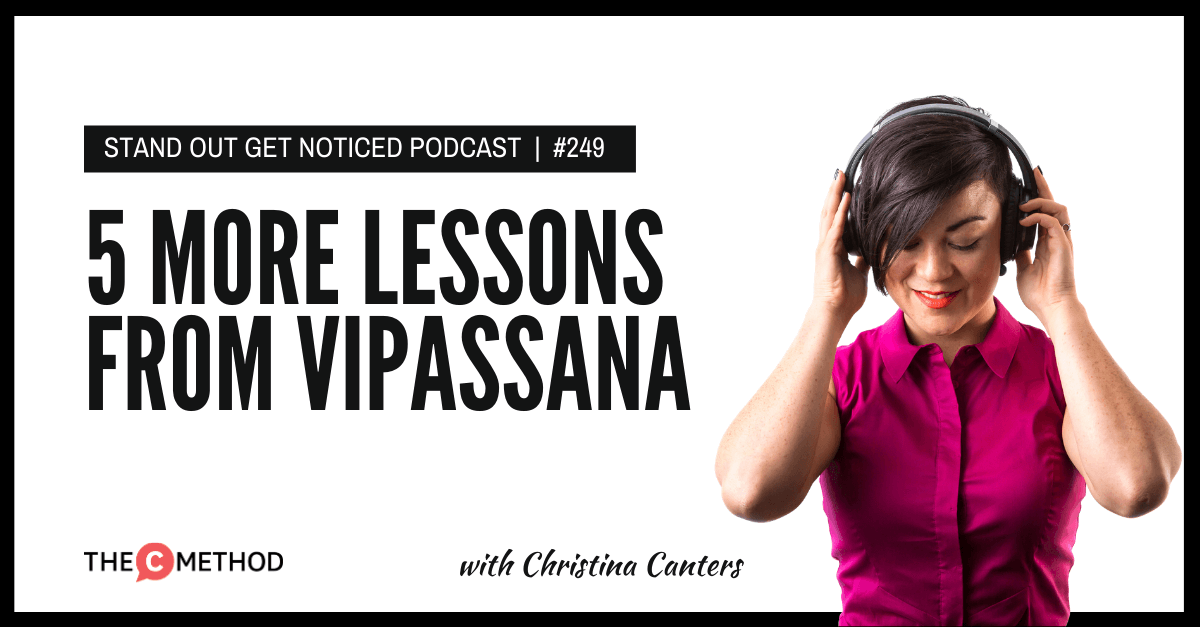It’s been almost two months since I returned from the 10 day Vipassana silent meditation course.
And I’m still processing what I learned. Being in the equivalent of solitary confinement for 10 days straight, with no communication with anyone, sitting on your behind and meditating for 10 hours a day certainly takes its toll both at a physical and emotional level.
In episode 245, I shared my breakdown of the experience, and in episode 246 I shared how I discovered the true secret to happiness. But, of course, there is so much more to share with you!
In this episode, you’ll hear 5 more lessons I took from the Vipassana course, and how they relate to day-to-day life experiences. A summary is below:
1. It’s not enough to understand something intellectually, you must learn it at an experiential level
Vipassana was all about intense, deep experiential learning. Which meant sitting down for 10 hours a day meditating. I experienced the PAIN and misery first hand. It was only then that I truly learned the impact of creating aversion (“This is the worst!”) and attachment (“I wish this would end!”)
In much the same way, you can listen to this podcast and think: ‘Yes, I know what mindset I need to reduce my anxiety when speaking to senior leaders’ – but unless you’ve experienced it for yourself, you’ll never truly know.
This is why I encourage you to DO the things that scare you. Experience what it’s like. That’s how you learn 😉
2. Everything is impermanent
Think about a river – it is constantly changing, millisecond to millisecond. We, too, as humans are constantly changing – new skin, nails hair and cells being constantly replenished. What I learned is that EVERYTHING in life is impermanent – whether it be your home, a relationship, a feeling, a thought.
In Vipassana, we experienced the impermanence by focusing on the physical sensations in the body (such as pins and needles, or a stabbing itch), and how they came and went, came and went. (Yes, if you take the time to noticed, your pins and needles go away…when your leg falls asleep and goes completely numb.)
So, as we were taught, why bother creating aversion and attachment to something that is impermanent?
You might get upset because you’re stuck in traffic on your way to an appointment. But when you arrive, your buddy is so happy to see you, you immediately feel better and you forget all about the traffic jam. But in that moment, you just created unnecessary misery for yourself.
If you live your life like this, you will be forever miserable. So if you’re going through a difficult time right now, remind yourself ‘This is impermanent, this is impermanent’ – it will help you to feel more at peace with the situation.
3. Pain and discomfort are here to teach us a lesson.
Most of the time, we try to avoid pain and discomfort. But what if you could shift your mindset and see them as tools to deepen your awareness and learning? Having that attitude helps you to distance yourself from the pain, instead of reacting to the pain.
I don’t often get angry, but occasionally I’ll have a little blowout. But instead of staying angry, I will use it as an opportunity to learn more about myself. I ask myself “What was it about that situation that triggered my emotion of anger? Maybe it’s because…”
Doing this allows me to diffuse my emotion much quicker. Instead of steaming over the situation, I can let it go.
4. Sometimes, the lessons we need to learn are the ones we don’t realise we need to learn
Before the course, I wrote down a list of intentions for what I wanted to ‘get out of’ the course:
- To cultivate feelings of peace, happiness and joy in any moment
- To have a deep connection to my intuition and higher self
- To get clear on what I REALLY want, and what I want to achieve in life
- To get clear on some business questions I had been asking myself
Did I fulfil those intentions? Ah…no.
Instead, I learned that I am the cause of my own misery, and that even though I consider myself a generally happy person – I still manage create misery…
…which I didn’t even know I needed to learn.
This is why reflecting on your life experiences is so critical. So stay open minded, and know that you have blind spots – stuff that you don’t know that you don’t know. And be open to absorb those lessons, as hard as they may be.
5. Everyone is suffering on the inside
Unless you’re a Buddhist monk who can levitate on command, I assure you that you are suffering. To be human is to suffer. The problem is, a lot of the time we think we are the only ones suffering.
During the meditation sessions at Vipassana, I would furtively glance around the room, and upon seeing my fellow students sitting motionless, seemingly at peace, I would wonder ‘Why is no one else in the same amount of pain as me? Everyone else is doing fine, I’m the only one with the issue!’
However, after the course, when silence was lifted, I discovered many of the other participants were in even MORE pain than I was. And everyone’s pain was different, but we all faced challenges.
So please know that most humans are very good at hiding the pain we’re in. Most people are faking it until they make it. Everyone is dealing with their own insecurities and fears, desperately hoping that they won’t be found out. I want you to know that you’re not alone!

Leave a Reply